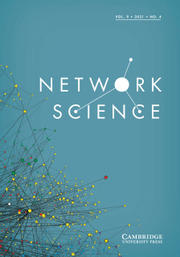Article contents
Political isolation in America
Published online by Cambridge University Press: 26 February 2020
Abstract
This study documents historical trends of size and political diversity in Americans’ discussion networks, which are often seen as important barometers of social and political health. Contrasting findings from data drawn out of a nationally representative survey experiment of 1,055 Americans during the contentious 2016 U.S. presidential election to data arising from 11 national data sets covering nearly three decades, we find that Americans’ core networks are significantly smaller and more politically homogeneous than at any other period. Several methodological artifacts seem unlikely to account for the effect. We show that in this period, more than before, “important matters” were often framed as political matters, and that this association probably accounts for the smaller networks.
Keywords
- Type
- Research Article
- Information
- Copyright
- © Cambridge University Press 2020
Footnotes
Special Issue Editors: Brea L. Perry, Bernice A. Pescosolido, Mario L. Small, and Ann McCranie
Data collected by Time-sharing Experiments for the Social Sciences, NSF Grant 0818839, Jeremy Freese and James Druckman, Principal Investigators. Please direct correspondence to Byungkyu Lee ([email protected]) or Peter Bearman ([email protected]). We thank Annie Russian for her assistance in text coding. Financial support from the Interdisciplinary Center for Innovative Theory and Empirics (INCITE) at Columbia University is gratefully acknowledged. Replication materials are available at https://dataverse.harvard.edu/dataverse/bk.
References
- 13
- Cited by


